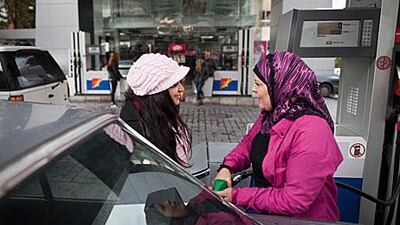SIDON, LEBANON // As a car pulls up to a petrol station in this southern Lebanese city, the driver gestures for an attendant to fill up the tank.
Amar Korjieh quickly rushes over to serve the customer at the station perched on a small hill above the ancient port town of Sidon. The 18-year-old is one of a group of young women working at the Queen Station, where about 80 per cent of the 40 workers are women.
Clad in their uniforms with requisite flashes of pink - woollen scarves and hats on this particularly cold winter's day - the women have taken on work in a field that in Lebanon is overwhelmingly dominated by men.
Many, including Miss Korjieh's own father, considered the job unsuitable for a Lebanese woman. The manual, outdoor work and constant interaction with men were seen as inappropriate.
"My father was shocked at the beginning, he didn't understand how a girl could work at a petrol station," Miss Korjieh says, after serving her customer. "But, he saw I liked the job, so he accepted it."
A well-known Sidon businessman, Merhi Abou Merhi and his wife, Huwaida, came up with the idea for the Queen Station as a place where women and their children would "feel comfortable" while refuelling their cars.
"Then, of course, it was also to find job positions for the girls," says Mrs Abou Merhi, sitting on a pink couch in the station's supermarket during a fleeting visit.
When it first opened in the residential neighbourhood of Hilaliyeh in February last year, the service station was viewed with suspicion by some and as an oddity by others.
Certainly, with its young female workers, pink decor and catchy name, the concept seems as much a marketing ploy as an effort to get women into the workforce.
Nearly a year on, staff - who pump petrol and work in the supermarket - say people have become accustomed to the idea. Customers pulling up appear unfazed by the female attendants at the station. It is clean, organised and does not have the normal, gritty garage feel.
"It's nice to be greeted by a smiling face," remarks 50-year-old engineer Mahmoud Hasoonah. "Half of the society accepts it, the other half may not."
Mohammed Samour, a 22-year-old staff member, distances himself from the "conservative mentality" he says is still prevalent in south Lebanon's largest city.
"I am with equality between men and women. My quote in life is 'real men aren't afraid to wear pink'!" he quips in fluent English.
These views are not necessarily shared by all in this conservative, majority Sunni Muslim town. During her shifts, Dania Kiblawi, 25, mostly stays working behind the checkout. Her father agreed to let her take a job at the station, but drew the line at her pumping petrol or cleaning windows.
"Some people, older people, said this is 'aib' [shameful]," she says. "They say, 'We're here in Lebanon, in Saida [Sidon]. Not in America'."
Sidon is a dry town where alcohol is not openly available. Just an hour from the capital, the city seems a world away from some parts of cosmopolitan, brash Beirut.
The security situation can also be volatile. This month a bomb was defused in the centre of the ancient town, thwarting what authorities believe was an assassination attempt against the head of a local political group.
Last year, two separate roadside bombs on the outskirts of Sidon targeted United Nations peacekeepers, injuring more than a dozen people.
Despite these unpredictable surroundings, the women working at the station seem determined to buck social expectations. There is a sense of camaraderie among the staff; they know they are doing something that goes against the grain.
Pumping petrol may not be even close to their ideal job - one of the young women is studying acting, another is an accounting graduate - but they say it is decent work. Earning a relatively decent wage - which at $500 (Dh1,836) is above the country's monthly minimum - also clearly doesn't hurt.
"It's changing the idea about how girls can work like boys, in the same jobs," says Aya Khairy Baik, an outgoing 20-year-old. "People need to change their minds. We're not doing anything wrong, just working."
The service station is not only operated by women; Samar Dakdouk also manages the place. Her own first job back in the 1980s was at a gas station in Los Angeles run by her brother.
Unlike the young women she now manages, the 45-year-old used to work night shifts, but always accompanied by two Dobermans.
"When I first heard about the station, I thought what a great idea," Ms Dakdouk says from behind the supermarket's bakery counter. "We're in the Middle East and especially in Saida, it's a male-dominated society."
"We just broke the rules," Mr Samoura interjects.
zconstantine@thenational.ae

